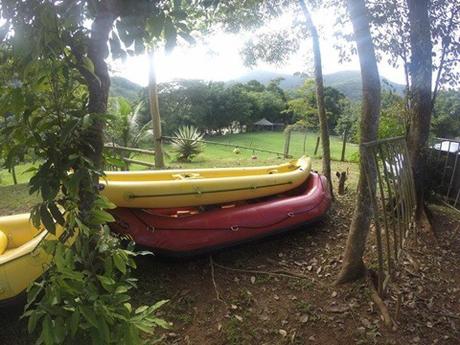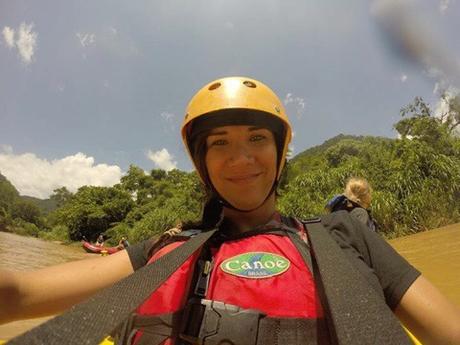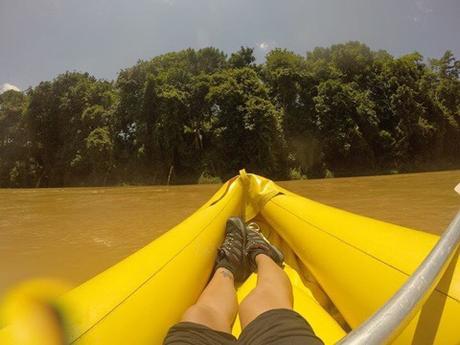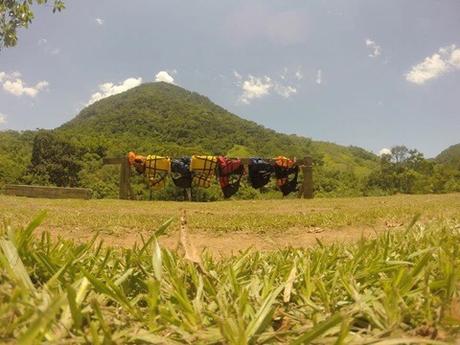Sometimes I have the clearest insight that some of my life choices are just plain stupid. Unfortunately, this usually becomes apparent only when it's too late to do anything about it.
Every indication I was about to do something stupid was going off in my body: sweaty palms, palpitating heart, general feeling of uneasiness. I tried to console myself that I had spent good money to do this; that I had spent weeks trying to convince a guide I was capable of kayaking in white water rapids with pretty much no kayaking experience. I tried to reassure myself that I could handle this solo. The fact that I was going solo was news to me. The pictures online had all been of smiling cheerful people with guides, but when I had arrived and kitted up I'd learned the four guides were going with the rafters and I was on my own.
Ducking in a Rubber Kayak
I'd come across the sport of ducking when researching what adventure options were available near Rio de Janeiro. Essentially it is kayaking through white water rapids in an inflatable hybrid kayak/raft. Unlike an enclosed kayak, the top is open and you basically just balance on it. The rubber shell is ideal for kayaking rapids because it won't break on the rocks. The kayaks are called "ducks" due to their bright yellow color.

The guides had me paddle in the slow current for a while, and then seemingly assured of my skills, gestured for me to set off. I took a deep breath and turned my GoPro on.
During summer in the Rio de Janeiro province, the water levels rise and you can expect Level III to V rapids. Ducking is best in winter when the water levels are low because you can go through areas that the larger, heavier rafts can't. During the summer, it helps to be in a heavier raft as you will automatically go through the deeper channels. Essentially between the rocks rather than over them. Without any real weight to me and without the upper body strength to paddle through strong currents, I often ended up going over rocks rather than around them, ending up stuck. Getting free of the rocks involved a lot of rocking my kayak back and forth while swearing.
Everything Started Off Good

The first major rapid was exhilarating. I've been white water rafting before and this was a very different experience. The adrenaline rush was amazing. Being alone in a tiny kayak, the water rolling over you and throwing you to and fro means there's no time to think. You simply react.
I stopped to rest with the two rafts and their guides toward the end of the trip, soaked and exhausted but a bit more confident in my skills. While I got stuck - and often at that - I was more or less keeping pace with the rafters and was still in my kayak. My arms and upper body ached. The main guide was counseling the rafters that this was going to be an intense rapid to get through and they'd be jumping to the floor of their rafts often to keep them from flipping. I must have looked wide-eyed because the guide quickly assured me I could do it.
"That's doubtful," I muttered.

He gestured me off and I started paddling toward the rapids. I slowed down as I saw them, the premonition that this wasn't going to end well shivering down my spine. I plotted the best course to avoid the rocks and then pushed off. The first pass was jarring but I was able to navigate through, my shoulders burning with the effort of extensively using unused muscles to fight the current.
At the second pass, I immediately got stuck on the rocks. I rocked my duck. Nothing happened. I bounced up and down. Still stuck. I shoved off the rocks with my oar and was rewarded by moving all of three feet before being stuck on the rocks below. I went back to rocking. The duck didn't budge. Several minutes ticked by while I fruitlessly tried to get myself unstuck. The kayak listed at a bad angle and I realized I wasn't getting off this rock without flipping. I looked around at the amount of boulders and realized it was going to be jarring when I did. I tried one last time to use my oar to shove off a rock.
The duck flipped.
Damage Control in the Water
When you fall out of your craft in rapids, you're counseled to put your feet in the direction you're going so that they take the impact of the rocks that you will absolutely hit. Lie on your back with your face up so you can breathe. Your PFD will keep you afloat. Your helmet will protect your head. In theory, anyway.

All of this is insanely hard to both remember and manage when you're being dragged under water and smashed into rocks. I was tossed around like rocks in a washing machine, unable to get my feet in the right direction. My ribs, hips and legs crashed hard into rocks. My head bounced off of rocks as I swallowed copious amounts of river water. In moments of clarity, I would struggle to the surface, gulping down air while the guides screamed incomprehensible instructions at me. Then it was back under the water.
Eventually the current slowed enough so that I could pitifully try to swim against it to the shore. My helmet had been pushed forward over my eyes during my struggle and my life jacket threatened to overtake me, but about ten feet from shore I was dragged unceremoniously out of the water by two of the guides. I sat shakily on the ground as they assessed me for broken bones and checked my pupils for possible concussion. I assured everyone I was ok before promptly throwing up all of the swallowed river water on the feet of one of the guides. He took it quite well.

When they took off my helmet, we realized my head was bleeding quite profusely. The two cuts weren't major but scalp wounds tend to bleed prolificly. I hadn't thought my head would be injured whilst wearing a helmet but then shuddered at the damage that could have been done had my helmet slipped off at any point.
It took two accomplished kayaking guides over forty minutes to retrieve my duck and get it unstuck from the rocks, so I never would have managed on my own. For some reason, that was a small comfort. They suggested I join them in one of the rafts while we towed my duck back, but because we only had two minor rapids left to navigate, I climbed back into my duck and set off without incident.
The next morning, I woke covered in bruises feeling like I had been hit by a semi truck. My head pounded to the point of wanting to be sick and my head started bleeding again when I took a hot shower.
Hopefully next time I learn to trust my instincts.

